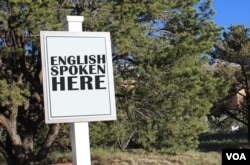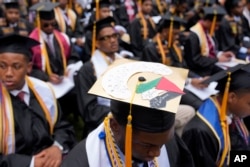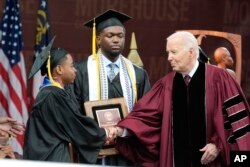Student Union
- By Hau Hoang
How to Speak English Fluently?
The most popular question I get from my friends in Vietnam is how to speak English fluently and correctly. I realize that it is a aching question that not just my friends, but also learners of this global language are trying to answer. In my case, even though I was taught English since the beginning of middle school in Vietnam, the things I learned then were barely adequate to carry out a conversation or even write up a letter in correct grammar.
In 9th grade, I decided to focus on studying English intensively on my own, which helped me land a scholarship to study in America through an exchange program – a thrilling turn for my education.
Obviously, being in the native speaking environment was a golden advantage, but at the same time, I still had to study and practice the language. By the end of high school, I was very confident with my English skills. All of my hard work paid off even more in college, because the classes at St. John’s College are discussion-based, so there’s a lot of talking.
Here are some of the things that worked for me when I was learning English. Since everyone has a different learning style, what worked for me won’t necessarily be best for you, but hopefully this will at least help you along.
Listen as much as possible
As I recall, the pronunciation I was taught in middle school in Vietnam are mostly incorrect. This is a common case because English pronunciation is not at all straightforward. There is nothing like the difficulty in trying to pronounce some of English's most difficult words. For me, the toughest words to master were words like "weird," "judge," and "noodle."
What helped was listening to native English speakers as much as possible, either through tapes, CDs, movies, or most prominently, the internet. I’m not exaggerating in saying that American movies and music were my principal English teachers in 9th grade. I would buy CDs of Westlife and Britney Spears, download the lyrics and sing along to the songs. And once in a while, my sister would bring me from Hanoi DVDs of American movies which I would watch over and over, and practice reading the subtitles along with the actors. I can still recite word-by-word the whole script of Mean Girls.
In this way, my English study was basically an immersion, though indirect, in the English language as well as the American culture. My pronunciation and speaking skill therefore improved very quickly. I got to learn the real English – what real Americans say to each other in everyday life; for example, saying "How are you doing?" instead of the ordinary "How are you?"
Judge yourself
When you practice speaking by repeating along with a recording, be somewhat hard on yourself, try to imitate as close as possible to the speaker's pronunciation, and most importantly, the intonation of the sentence - this will help you carry out a more natural and smooth conversation in English.
It is also very helpful to have a dictionary with International Phonetics Alphabet (IPA) pronunciation (I recommend Oxford, Macmillan, or Dictionary.com for those who have home internet access). Of course, the first step would be to learn how to read the IPA symbols (some YouTube videos can help teach you that). I always use this guide to learn the pronunciations of new words, and also to make sense of the pronunciation in the recording.
Specifically, by looking at the "anatomy" of the pronunciation, you will be able to greatly improve your pronunciation. For example, since Vietnamese words all have one syllable, a lot of Vietnamese pronounce the word “hôm” for “home” since their sounds are seemingly equivalent. When you look up the IPA pronunciation of this word, however, you will see that it actually consists of two syllables /ho-ʊm/. As a result, you should practice perfecting your pronunciation by saying the two syllables separately and quickly. Eventually it will become an instinctive thing to pronounce “home" in that correct manner.
Variety is key
For me, the key to speaking English fluently is sentence structures. The more structures you know, the more comfortable you will be when trying to express your thoughts.
My advice would be try to master the fundamental structures - “for example,” “I think that,” “it is interesting that,” “I find it,” “it is better to,” “not only … but also” - by practicing them over and over. A good familiarity with the structures will help with the coherence of the conversation.
As you expand your knowledge in sentence structures, it is also important to augment your vocabulary. It is always wise to constantly try new words in conversation due to the mutual relationship between speaking and learning new words: you need more words to express your thoughts precisely, and at the same time, it is easiest to learn new words when they are uttered and put in context.
Learning to speak English fluently is a difficult task. On top all of the tips I listed above, my final advice would be to practice as much as possible because really, practice makes perfect. Good luck everyone!
See all News Updates of the Day
- By VOA News
Writer offers packing tips for international students
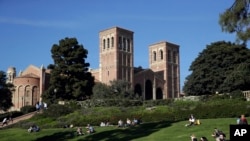
Deciding what to bring to college can be daunting.
A student from Singapore writes about her must-haves as an international student in the U.S.
Read it here. (April 2024)
- By VOA News
Siblings flourish at University of Cincinnati
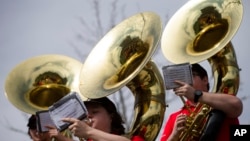
Two sets of siblings -- on from Kuwait and one from Saudi Arabia -- talk about their experiences as international students at the University of Cincinnati in the U.S. state of Ohio.
Read the story here. (April 2024)
Pro-Palestinian protesters set up a new encampment at Philadelphia's Drexel University

Pro-Palestinian protesters set up a new encampment at Drexel University in Philadelphia over the weekend, prompting a lockdown of school buildings, a day after authorities thwarted an attempted occupation of a school building at the neighboring University of Pennsylvania campus.
After several hundred demonstrators marched from Philadelphia's City Hall to west Philadelphia on Saturday afternoon, Drexel said in a statement that about 75 protesters began to set up an encampment on the Korman Quad on the campus. About a dozen tents remained Sunday, blocked off by barricades and monitored by police officers. No arrests were reported.
Drexel President John Fry said in a message Saturday night that the encampment "raises understandable concerns about ensuring everyone's safety," citing what he called "many well-documented instances of hateful speech and intimidating behavior at other campus demonstrations." University buildings were "open only to those with clearance from Drexel's Public Safety," he said.
Authorities at Drexel, which has about 22,000 students, were monitoring the demonstration to ensure it was peaceful and didn't disrupt normal operations, and that "participants and passersby will behave respectfully toward one another," Fry said.
"We will be prepared to respond quickly to any disruptive or threatening behavior by anyone," Fry said, vowing not to tolerate property destruction, "harassment or intimidation" of students or staff or threatening behavior of any kind, including "explicitly racist, antisemitic, or Islamophobic" speech. Anyone not part of the Drexel community would not be allowed "to trespass into our buildings and student residences," he said.
On Friday night, members of Penn Students Against the Occupation of Palestine had announced an action at the University of Pennsylvania's Fisher-Bennett Hall, urging supporters to bring "flags, pots, pans, noise-makers, megaphones" and other items.
The university said campus police, supported by city police, removed the demonstrators Friday night, arresting 19 people, including six University of Pennsylvania students. The university's division of public safety said officials found "lock-picking tools and homemade metal shields," and exit doors secured with zip ties and barbed wire, windows covered with newspaper and cardboard and entrances blocked.
Authorities said seven people arrested would face felony charges, including one accused of having assaulted an officer, while a dozen were issued citations for failing to disperse and follow police commands.
The attempted occupation of the building came a week after city and campus police broke up a two-week encampment on the campus, arresting 33 people, nine of whom were students and two dozen of whom had "no Penn affiliation," according to university officials.
On Sunday, dozens of George Washington University graduates walked out of commencement ceremonies, disrupting university President Ellen Granberg's speech, in protest over the ongoing siege of Gaza and last week's clearing of an on-campus protest encampment that involved police use of pepper spray and dozens of arrests.
The ceremony, at the base of the Washington Monument, started peacefully with fewer than 100 protesters demonstrating across the street in front of the Museum of African American History and Culture. But as Granberg began speaking, at least 70 students among the graduates started chanting and raising signs and Palestinian flags. The students then noisily walked out as Granberg spoke, crossing the street to a rapturous response from the protesters.
Students and others have set up tent encampments on campuses around the country to protest the Israel-Hamas war, pressing colleges to cut financial ties with Israel. Tensions over the war have been high on campuses since the fall but demonstrations spread quickly following an April 18 police crackdown on an encampment at Columbia University.
Nearly 3,000 people have been arrested on U.S. campuses over the past month. As summer break approaches, there have been fewer new arrests and campuses have been calmer. Still, colleges have been vigilant for disruptions to commencement ceremonies.
President Joe Biden told the graduating class at Morehouse College on Sunday, which included some students wearing keffiyeh scarves around their shoulders on top of their black graduation robes, that he heard their voices of protest and that scenes from the conflict in Gaza have been heartbreaking. Biden said given what he called a "humanitarian crisis" there, he had called for "an immediate cease-fire" and return of hostages taken by Hamas.
The latest Israel-Hamas war began when Hamas and other militants stormed into southern Israel on Oct. 7, killing around 1,200 people and taking an additional 250 hostage. Palestinian militants still hold about 100 captives, while Israel's military offensive has left more than 35,000 people in Gaza dead, according to the territory’s health ministry, which doesn't distinguish between civilians and combatants.
Biden tells Morehouse graduates that he hears their voices of protest over war in Gaza
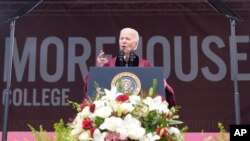
President Joe Biden on Sunday told the graduating class at Morehouse College that he heard their voices of protest over the Israel-Hamas war, and that scenes from the conflict in Gaza have been heartbreaking.
"I support peaceful nonviolent protest," he told students, some who wore keffiyeh scarves around their shoulders on top of their black graduation robes. "Your voices should be heard, and I promise you I hear them."
The president told the crowd that it was a "humanitarian crisis in Gaza, that's why I've called for an immediate cease-fire to stop the fighting" and bring home the hostages taken when Hamas attacked Israel on Oct. 7. The comments, toward the end of his address that also reflected on American democracy and his role in safeguarding it, were the most direct recognition to U.S. students about the campus protests that have swept across the country.
Morehouse's announcement that Biden would be the commencement speaker drew some backlash among the school's faculty and supporters who oppose Biden's handling of the war. Some Morehouse alumni circulated an online letter condemning school administrators for inviting Biden and soliciting signatures to pressure Morehouse President David Thomas to rescind it.
The letter claimed that Biden's approach to Israel amounted to support of genocide in Gaza and was out of step with the pacifism expressed by Martin Luther King Jr., Morehouse's most famous graduate.
The Hamas attack on southern Israel killed 1,200 people. Israel's offensive has killed more than 35,000 Palestinians in Gaza, according to local health officials.
Some members of the graduating class showed support for Palestinians in Gaza by tying keffiyeh scarves around their shoulders on top of their black graduation robes. One student draped himself in a Palestinian flag. On the stage behind the president, academics unfurled a Democratic Republic of Congo flag.
The country has been mired in an ongoing civil war that has plunged the nation into violence and displaced millions of people. Many racial justice advocates have called for greater attention to the conflict and for greater attention in the US to the conflict as well as American aid in ending the violence.
"Thank you God for this 'woke' class of 2024 that is in tune with the zeitgeist, the spirit of the times," the Rev. Claybon Lea Jr. said during a prayer at the start of the commencement.
The class valedictorian, DeAngelo Jeremiah Fletcher, said at the close of his speech that it was his duty to speak on the war in Gaza and that it was important to recognize that both Palestinians and Israelis have suffered.
"From the comfort of our homes, we watch an unprecedented number of civilians mourn the loss of men, women and children, while calling for the release of all hostages he said. "It is my stance as a Morehouse man, nay as a human being, to call for an immediate and permanent cease-fire in the Gaza Strip."
Biden stook and shook his hand after Fletcher finished.
The speech, and a separate one Biden is giving later Sunday in the Midwest, is part of a burst of outreach to Black constituents by the president, who has watched his support among these voters soften since their strong backing helped put him in the Oval Office in 2020.
After speaking at Morehouse in Atlanta, Biden will travel to Detroit to address an NAACP dinner.
Georgia and Michigan are among a handful of states that will help decide November's expected rematch between Biden and Republican former President Donald Trump. Biden narrowly won Georgia and Michigan in 2020 and needs to repeat — with a boost from strong Black voter turnout in both cities.
Biden spent the back end of the past week reaching out to Black constituents. He met with plaintiffs and relatives of those involved in Brown v. Board of Education, the landmark 1954 Supreme Court decision that outlawed racial segregation in public schools. He also met with members of the "Divine Nine" Black fraternities and sororities and spoke with members of the Little Rock Nine, who helped integrate a public school in Little Rock, Arkansas, in 1957.
In Detroit, Biden was set to visit a Black-owned small business before delivering the keynote address at the NAACP's Freedom Fund dinner, which traditionally draws thousands of attendees. The speech gives Biden a chance to reach thousands of people in Wayne County, an area that has historically voted overwhelmingly Democratic but has shown signs of resistance to his reelection bid.
Wayne County also holds one of the largest Arab American populations in the nation, predominantly in the city of Dearborn. Leaders there were at the forefront of an "uncommitted" effort that received over 100,000 votes in the state's Democratic primary and spread across the country.
A protest rally and march against Biden's visit are planned for Sunday afternoon in Dearborn. Another protest rally is expected later that evening outside Huntington Place, the dinner venue.
US remains top choice for Indian students going abroad
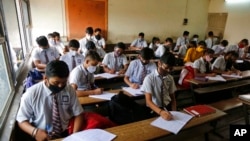
About 69% of Indian students traveling abroad for their studies chose the United States, according to a Oxford International’s Student Global Mobility Index. Other popular choices were the United Kingdom, Canada and Australia.
Education Times reports the main influencers for deciding where to study abroad – for Indian students and others – were parents. (April 2024)




